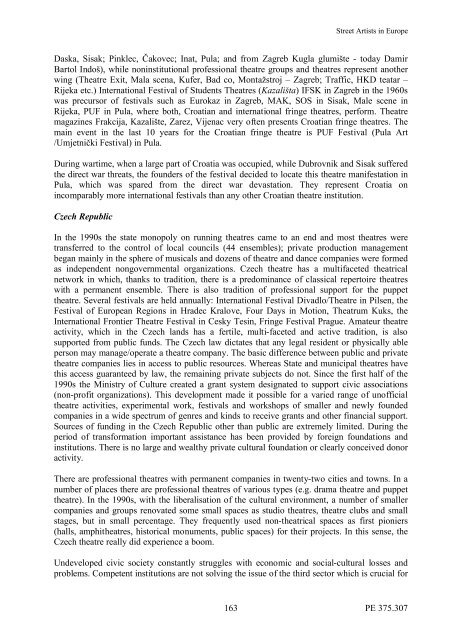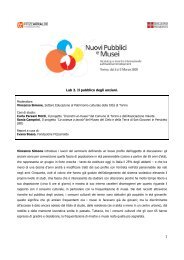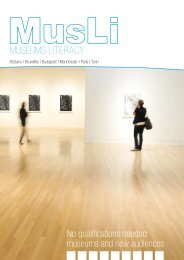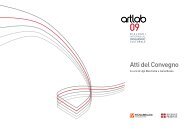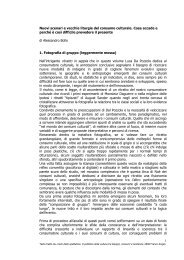STREET ARTISTS IN EUROPE - Fondazione Fitzcarraldo
STREET ARTISTS IN EUROPE - Fondazione Fitzcarraldo
STREET ARTISTS IN EUROPE - Fondazione Fitzcarraldo
Create successful ePaper yourself
Turn your PDF publications into a flip-book with our unique Google optimized e-Paper software.
Street Artists in Europe<br />
Daska, Sisak; Pinklec, Čakovec; Inat, Pula; and from Zagreb Kugla glumište - today Damir<br />
Bartol Indoš), while noninstitutional professional theatre groups and theatres represent another<br />
wing (Theatre Exit, Mala scena, Kufer, Bad co, Montažstroj – Zagreb; Traffic, HKD teatar –<br />
Rijeka etc.) International Festival of Students Theatres (Kazališta) IFSK in Zagreb in the 1960s<br />
was precursor of festivals such as Eurokaz in Zagreb, MAK, SOS in Sisak, Male scene in<br />
Rijeka, PUF in Pula, where both, Croatian and international fringe theatres, perform. Theatre<br />
magazines Frakcija, Kazalište, Zarez, Vijenac very often presents Croatian fringe theatres. The<br />
main event in the last 10 years for the Croatian fringe theatre is PUF Festival (Pula Art<br />
/Umjetnički Festival) in Pula.<br />
During wartime, when a large part of Croatia was occupied, while Dubrovnik and Sisak suffered<br />
the direct war threats, the founders of the festival decided to locate this theatre manifestation in<br />
Pula, which was spared from the direct war devastation. They represent Croatia on<br />
incomparably more international festivals than any other Croatian theatre institution.<br />
Czech Republic<br />
In the 1990s the state monopoly on running theatres came to an end and most theatres were<br />
transferred to the control of local councils (44 ensembles); private production management<br />
began mainly in the sphere of musicals and dozens of theatre and dance companies were formed<br />
as independent nongovernmental organizations. Czech theatre has a multifaceted theatrical<br />
network in which, thanks to tradition, there is a predominance of classical repertoire theatres<br />
with a permanent ensemble. There is also tradition of professional support for the puppet<br />
theatre. Several festivals are held annually: International Festival Divadlo/Theatre in Pilsen, the<br />
Festival of European Regions in Hradec Kralove, Four Days in Motion, Theatrum Kuks, the<br />
International Frontier Theatre Festival in Cesky Tesin, Fringe Festival Prague. Amateur theatre<br />
activity, which in the Czech lands has a fertile, multi-faceted and active tradition, is also<br />
supported from public funds. The Czech law dictates that any legal resident or physically able<br />
person may manage/operate a theatre company. The basic difference between public and private<br />
theatre companies lies in access to public resources. Whereas State and municipal theatres have<br />
this access guaranteed by law, the remaining private subjects do not. Since the first half of the<br />
1990s the Ministry of Culture created a grant system designated to support civic associations<br />
(non-profit organizations). This development made it possible for a varied range of unofficial<br />
theatre activities, experimental work, festivals and workshops of smaller and newly founded<br />
companies in a wide spectrum of genres and kinds to receive grants and other financial support.<br />
Sources of funding in the Czech Republic other than public are extremely limited. During the<br />
period of transformation important assistance has been provided by foreign foundations and<br />
institutions. There is no large and wealthy private cultural foundation or clearly conceived donor<br />
activity.<br />
There are professional theatres with permanent companies in twenty-two cities and towns. In a<br />
number of places there are professional theatres of various types (e.g. drama theatre and puppet<br />
theatre). In the 1990s, with the liberalisation of the cultural environment, a number of smaller<br />
companies and groups renovated some small spaces as studio theatres, theatre clubs and small<br />
stages, but in small percentage. They frequently used non-theatrical spaces as first pioniers<br />
(halls, amphitheatres, historical monuments, public spaces) for their projects. In this sense, the<br />
Czech theatre really did experience a boom.<br />
Undeveloped civic society constantly struggles with economic and social-cultural losses and<br />
problems. Competent institutions are not solving the issue of the third sector which is crucial for<br />
163<br />
PE 375.307


